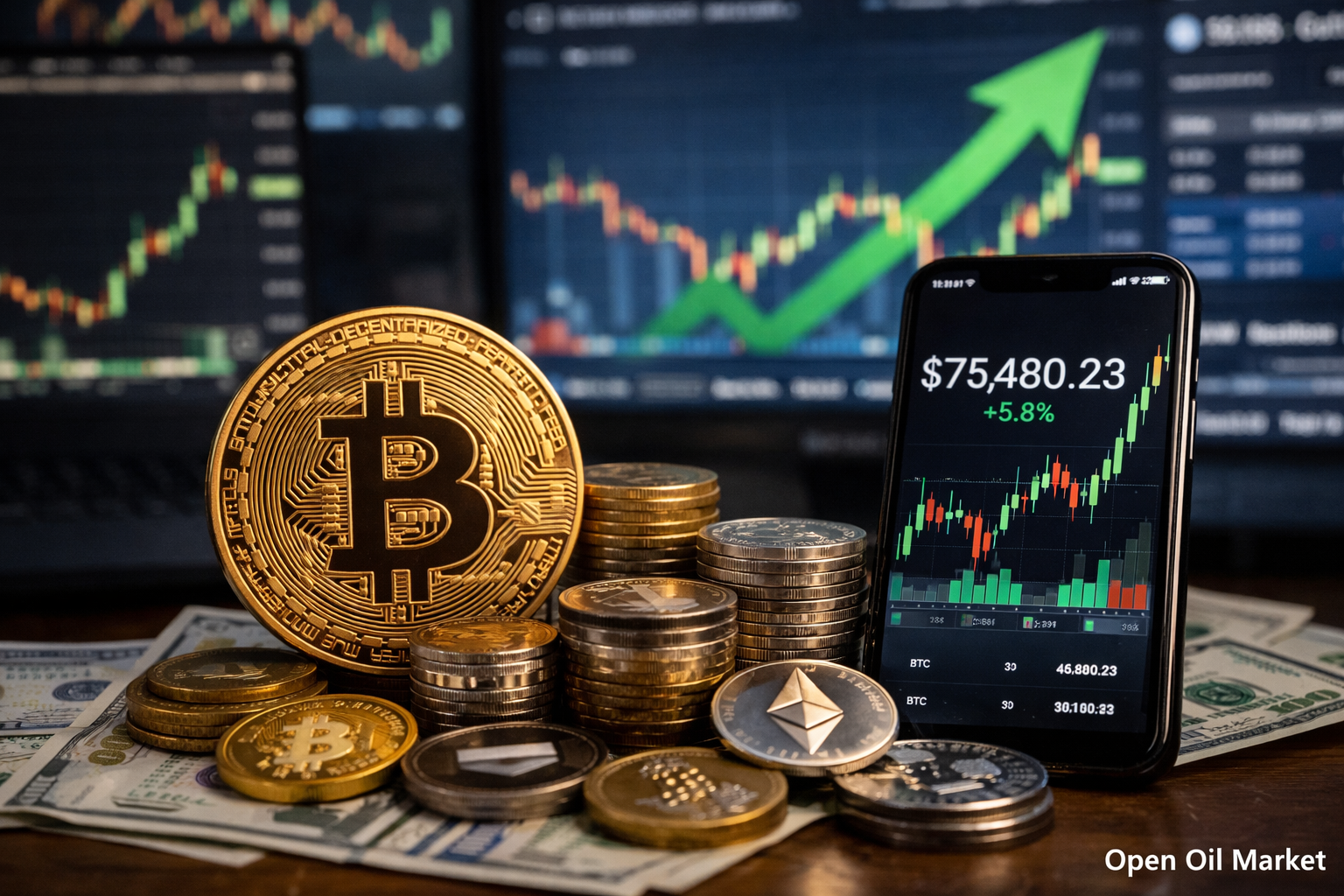
The Global Venture Capital Market Recovers: Record Investments in Artificial Intelligence, the Return of Mega-Funds, Revitalisation of IPOs, and Increased Interest in Climate and Biotech Startups
By mid-October 2025, the global venture capital market is steadily recovering after several years of decline. Investors worldwide are once again actively funding technology startups — record deals are being made, and companies are revisiting plans for initial public offerings (IPOs). Major players are re-entering with substantial investments, while governments are ramping up support for innovation. As a result, private capital is progressively returning to the startup ecosystem, giving it a new impetus.
Venture activity is on the rise across all regions. The United States continues to lead (particularly in the AI sector), while venture investment in the Middle East has nearly doubled over the past year, and Germany has surpassed the UK for the first time in deal volume. India, Southeast Asia, and countries in the Gulf Cooperation Council (GCC) are attracting record capital flows amid declining activity in China. The startup scenes in the Commonwealth of Independent States (CIS) are also striving to keep pace, despite external restrictions. Overall, a new global venture boom is observed, although investors remain selective and cautious.
Below are some key events and trends shaping the venture capital landscape as of 17 October 2025:
- The return of mega-funds and large investors. Leading venture funds are attracting unprecedented amounts of capital and increasing investments, saturating the market with liquidity and fuelling a risk appetite.
- Record investments in AI and new "unicorns." Exceptionally large funding rounds are pushing startup valuations to unprecedented heights, especially in the AI segment.
- Revitalisation of the IPO market. Successful public listings by technology companies and new listing applications confirm that the long-awaited "window" for exits has reopened.
- Diversification of sector focus. Venture capital is flowing not only into AI but also into fintech, climate technologies, biotech, defence projects, and even crypto startups.
- A wave of consolidation and M&A deals. Major mergers, acquisitions, and strategic investments are reshaping the industry landscape, creating exits and accelerating growth opportunities.
- Local focus: Russia and the CIS. Despite restrictions, new funds and initiatives are being launched in the region to develop local startup ecosystems, gradually attracting investor attention.
The Return of Mega-Funds: Big Money is Back in the Market
The largest investment players are triumphantly re-entering the venture arena, signalling a renewed appetite for risk. The Japanese conglomerate SoftBank recently launched its Vision Fund III, with a capital of approximately $40 billion, focusing on advanced technologies (including artificial intelligence and robotics). Sovereign funds from the Gulf countries are also becoming active: they are pouring billions into technology projects and rolling out state mega-programmes to support startups, turning the Middle East into a new tech hub. Simultaneously, numerous new venture funds are being established worldwide, attracting significant institutional capital for investments in high-tech sectors.
Renowned firms from Silicon Valley are also increasing their presence. In the American venture sector, funds have accumulated record reserves of uninvested capital ("dry powder") — hundreds of billions of dollars ready to be deployed as market confidence returns. The influx of this "big money" is filling the startup market with liquidity, providing resources for new funding rounds and supporting the growth of promising companies. The return of mega-funds and large institutional investors not only intensifies competition for the best deals but also instils confidence in the sector regarding continued capital inflows.
Record Investments in AI and a New Wave of "Unicorns"
The artificial intelligence sector remains the main driver of the current venture boom, demonstrating record levels of funding. Investors are eager to position themselves among AI leaders, directing colossal sums into the most promising projects. For instance, Elon Musk's startup xAI secured approximately $10 billion, while OpenAI garnered around $8 billion at a valuation of approximately $300 billion — both funding rounds were significantly oversubscribed, underscoring the excitement surrounding AI companies.
Notably, investments are being made not only in end AI applications but also in the infrastructure that supports them. Rumours suggest that a startup specialising in data storage for AI is negotiating a multi-billion dollar funding round at a very high valuation — the market is ready to finance even the "shovels and picks" for the new AI ecosystem. The current investment boom is generating a wave of new "unicorns" — companies valued at over $1 billion. Although some experts warn of overheating risks, investor appetite for AI startups remains strong.
The IPO Market Revitalises: A Window of Opportunity for Exits
The global market for initial public offerings (IPOs) is emerging from its slumber and gaining momentum. In Asia, Hong Kong has sparked a new wave of technology IPOs: over recent weeks, several major companies have gone public, collectively raising billions of dollars. For example, the Chinese battery giant CATL successfully listed, raising approximately $5 billion, demonstrating investors' willingness in the region to actively participate in new listings once again.
The situation is also improving in the US and Europe. The American fintech unicorn Chime recently debuted on the stock exchange — its shares rose by about 30% on the first trading day. Following suit, the design platform Figma conducted an IPO, attracting approximately $1.2 billion at an estimated valuation of around $15–20 billion, and its shares also robustly increased in the initial days. In the second half of 2025, other prominent startups, including the payment service Stripe and several companies with multi-billion valuations, are preparing to go public.
Even the cryptocurrency industry is attempting to take advantage of improving conditions. The fintech company Circle successfully went public in the summer (its shares then surged), and the cryptocurrency exchange Bullish has applied for a listing in the US with a target valuation of around $4 billion. The resurgence of IPO market activity is crucial for the venture ecosystem: successful public exits allow funds to realise profits, return capital to investors, and direct freed-up resources into new projects.
Diversification of Investments: Not Just AI
In 2025, venture investments are encompassing an increasingly broad range of sectors and are no longer limited to artificial intelligence. After last year's downturn, fintech is regaining momentum: significant funding rounds are taking place not only in the US but also in Europe and emerging markets, fuelling the growth of new digital financial services. Simultaneously, there is growing interest in climate and "green" technologies: projects in renewable energy, eco-friendly solutions, and agrotech are attracting record investments amid the global trend towards sustainability.
There is also a revival of interest in biotechnology. The emergence of new promising drug developments and medtech platforms is once again drawing capital, as the sector gradually emerges from a period of declining valuations. Furthermore, driven by heightened attention to security, investors are increasingly supporting defence-tech startups creating solutions for protection and defence. Even within the cryptocurrency segment, signs of life have emerged: a partial restoration of trust in the market has allowed some blockchain startups to once again secure funding. The expansion of sector focus is making the entire startup ecosystem more resilient and reducing the risk of overheating in specific segments.
Consolidation and M&A Deals: The Consolidation of Players
High startup valuations and fierce competition are pushing the industry towards consolidation. Major mergers and acquisitions are once again coming to the forefront, reshaping market dynamics. For instance, Google has agreed to acquire the Israeli cybersecurity startup Wiz for approximately $32 billion — a record sum for the tech sector in Israel. Such mega-deals demonstrate the desire of tech giants to secure key technologies and talent.
Additionally, consolidation is occurring within the venture sector itself. For example, investment bank Goldman Sachs has announced the acquisition of venture firm Industry Ventures for nearly $1 billion, highlighting the increasing interconnectivity between traditional finance and the startup world. In general, the activation of M&A and major strategic deals indicates market maturation. Mature startups are merging with each other or becoming acquisition targets for corporations, providing venture investors with much-anticipated profitable exits and accelerating the scaling of innovations.
Russia and the CIS: Local Initiatives Amid Global Trends
Despite external restrictions, there is a resurgence of startup activity in Russia and neighbouring countries. Several new venture funds with a total volume of approximately 10–12 billion rubles have been announced, focusing on supporting early-stage technology projects. Local startups are beginning to attract serious capital: for example, the Krasnodar-based foodtech startup Qummy secured around 440 million rubles in investments at an estimated valuation of approximately 2.4 billion rubles. Moreover, foreign investors are once again permitted to fund local projects in Russia, gradually rekindling foreign capital interest in the region.
While venture investment volumes in Russia and the CIS remain relatively modest compared to global figures, they are steadily increasing. Some large companies are considering taking their technology divisions public as market conditions improve — for instance, the VK holding company has indicated the possibility of a public offering for its VK Tech division in the foreseeable future. New state support measures and corporate initiatives are aimed at giving a further boost to local startup ecosystems and integrating them into global trends.
Measured Optimism and Quality Growth
By October 2025, the venture market is displaying moderately optimistic sentiments: successful IPOs and major deals indicate that the downturn has been left behind. However, investors remain selective, preferring startups with sustainable business models and realistic growth plans. Robust capital inflows into AI and other advanced sectors instil confidence, yet funds are keen to diversify investments and tighten risk controls to ensure the new upswing does not turn into overheating. Thus, the industry is entering a new phase of development with an emphasis on quality, balanced growth in innovations and capital.




